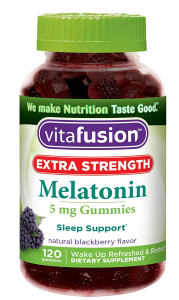Melatonin Safety Tips
If you use melatonin to help sleep, you can rest assured that even if you take way too much, it isn’t going to hurt you (although you’ll probably regret it the next day). It’s generally safe for short-term use, is non-habit-forming, and studies show that it does have some benefit as a sleep aid.
But as with any medication or supplement, it’s best to take the smallest, effective dosepossible. From there, you can add onto your dosage as needed. This method will reduce the likelihood of side-effects. If you have a health condition or are taking prescription medications, you should talk to your doctor before you start taking it.
Signs You’ve Taken Too Much Melatonin
Taking too much melatonin over a long period of time, can have damaging side effects.
The first sign that your dosage was too high the night before is waking up with a melatonin hangover. You may feel groggy, sleepy, or have a headache, you may have taken too much melatonin.
High levels of melatonin in the bloodstream may also be signaled by mild depression, low body temperature (hypothermia), irritability, and stomach cramps. Mild tremors and low blood pressure are less common but could be symptoms of too much melatonin.
Taking too much melatonin for too long can support a condition called rebound insomnia. As melatonin is a hormone that regulates your body clock, flooding it with one hormone can create an imbalance that may knock your entire body clock out of sync.
Is Melatonin Habit-Forming?
One upside to using melatonin is that you’re not likely to become dependent on it, which can happen with prescription sleep aids. However, taking high doses for a long period of time can have the opposite of the desired effect — it will keep you up instead of helping you sleep. This happens because using too much melatonin for too long can desensitize the body’s neurological receptors, dulling the impact melatonin has on regulating sleep.
If melatonin is not helping you sleep after 1-2 weeks of use, it’s likely never going to help you.
Is Melatonin Safe for Children?
Giving melatonin to children can be a controversial topic. In Europe, melatonin supplements are actually prescription-only medicine that is intended solely for adults. In the USA, the FDA has neither approved its use nor evaluated its safety in children.
There are many reasons why a child or adolescent may experience sleep interruptions. Emotional stressors such as a divorce, moving to a new town, attending a new school or moving up to a new grade can cause anxiety and disrupt sleep. Teens can experience a circadian rhythm disorder called “delayed sleep phase” in which the natural sleep and rise times are much later than normal (by three hours or more). Melatonin has been helpful to manage delayed sleep phase in teens, along with other adjustments such as reduced screen time before sleep, black out curtains, and other measures to reduce light exposure in the evening.
Since melatonin is a hormone, giving it to your child may have unanticipated results. Some studies have suggested that melatonin usage in children may delay puberty, but the reality is that there isn’t enough research on the matter to draw conclusive evidence.
That said, studies have found that melatonin can shorten the time it takes to fall asleep in children with sleep problems — especially children with ADHD and autism. However, there isn’t much evidence that melatonin is helpful for children who wake in the night and can’t get back to sleep.
Long-term studies are needed before melatonin can be used with absolute safety in children. If your child cannot sleep, it may be best to resort to sour cherry juice, or other melatonin-inducing foods and drinks, to help them fall asleep.
What Else Should You Consider When Buying Melatonin?
Melatonin is a supplement according to the FDA, so it’s not strictly regulated. As a result, purity, quality and safety are all subject to interpretation by each brand that makes the supplement.
Melatonin has been known to have several benefits beyond sleep aid, but it’s important to speak to a medical professional before taking melatonin supplements. And although the hormone is showing promise in cancer treatment and as an aid for people with some cognitive illnesses, it is not a cure for these diseases or conditions.
Researchers are working hard to unveil the myriad advantages melatonin supplements can bring to the human body, but there is still much more research ahead to understand its true worth and benefits at a medical level. For now, it may be best to use it occasionally to get a good night of sleep, especially when your sleep wake cycle has been thrown off of its natural course, such as from jet lag.




